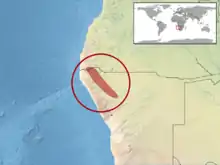| Sepsina alberti | |
|---|---|
| Scientific classification | |
| Domain: | Eukaryota |
| Kingdom: | Animalia |
| Phylum: | Chordata |
| Class: | Reptilia |
| Order: | Squamata |
| Family: | Scincidae |
| Genus: | Sepsina |
| Species: | S. alberti |
| Binomial name | |
| Sepsina alberti Hewitt, 1929 | |
 | |
Sepsina alberti, also known commonly as Albert's skink and Albert's burrowing skink, is a species of lizard in the family Scincidae. The species is endemic to Namibia.[2]
Etymology
Unfortunately, Hewitt did not explain to whom the specific name, alberti, refers. It may be in honor of Albert I of Belgium, or Belgian-British herpetologist George Albert Boulenger, or an altogether different Albert.[3]
Habitat
The preferred natural habitats of S. alberti are rocky areas and savanna, at altitudes of 500–1,300 m (1,600–4,300 ft).[1]
Description
Adults of S. alberti usually have a snout-to-vent length (SVL) of 4–5 centimetres (1.6–2.0 in). The maximum recorded SVL is 5.5 cm (2.2 in). The legs are short, but well developed, with four toes on each foot, and with a claw on each toe.[4]
Reproduction
S. alberti is viviparous.[2]
References
- 1 2 Conradie W, Becker F, Baptista N, Bauer AM, Ceríaco LMP (2020). "Sepsina alberti ". The IUCN Red List of Threatened Species 2020: e.T174135A120594155. https://dx.doi.org/10.2305/IUCN.UK.2020-3.RLTS.T174135A120594155.en. Downloaded on 06 September 2020.
- 1 2 Sepsina alberti at the Reptarium.cz Reptile Database. Accessed 20 October 2020.
- ↑ Beolens, Bo; Watkins, Michael; Grayson, Michael (2011). The Eponym Dictionary of Reptiles. Baltimore: Johns Hopkins University Press. xiii + 296 pp. ISBN 978-1-4214-0135-5. (Sepsina alberti, p. 4).
- ↑ Branch, Bill (2004). Field Guide to Snakes and other Reptiles of Southern Africa. Third Revised edition, Second impression. Sanibel Island, Florida: Ralph Curtis Books. 399 pp. ISBN 0-88359-042-5. (Sepsina alberti, p. 145 + Plate 49).
Further reading
- Hewitt H (1929). "On some Scincidae from South Africa, Madagascar and Ceylon". Annals of the Transvaal Museum 13 (1): 1–8. (Sepsina alberti, p. 4).
